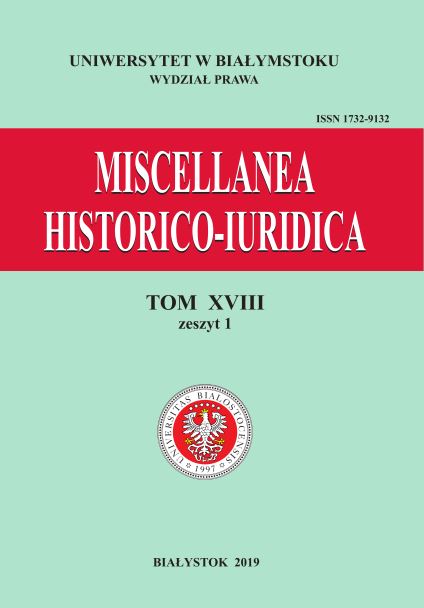Ochrona praw mniejszości w II Rzeczypospolitej Polskiej w świetle postanowień tzw. małego traktatu wersalskiego z 1919 r.
Protection of minority rights in the Second Republic of Poland in the light of the provisions of so the called ‘small treaty of Versailles’ of 1919
Author(s): Marcin ŁyskoSubject(s): Law, Constitution, Jurisprudence, History of Law, Sociology of Law
Published by: Wydawnictwo Uniwersytetu w Białymstoku
Keywords: mały traktat wersalski; mniejszości narodowe; Rada Ligia Narodów; II Rzeczpospolita Polska; small treaty of Versailles; national minorities; League of Nations Council; Second Republic of Poland
Summary/Abstract: The Versailles system of the protection of national minorities’ rights was based on international agreements which had been imposed by the victorious powers of Entanta onto the former central states (except Germany), and on to the states formed after World War I. Compliance with the provisions of the minority treaties was covered by political and judicial guarantees from the League of Nations. The first of the series of minority treaties was the treaty signed by Poland on June 28, 1919, simultaneously with the peace treaty with Germany. The so-called ‘small treaty of Versailles’ obliged the Polish state to introduce the principle of equality before the law of all citizens regardless of nationality, to ensure freedom of religious practice, and to grant minorities specific language rights in education and the judiciary. The Jewish population obtained the right to celebrate the Sabbath on Saturday, and to run state-funded schools in Yiddish as a language of instruction. Treaty obligations for all minorities had been given the status of fundamental rights by including them in the March Constitution of 1921. Because the Polish state pursued an ethnic policy unfavourable to minorities, numerous violations of the treaty by its organs were the subject of petitions addressed to the League of Nations Council. The practice-oriented petition procedure allowed representatives of minorities to submit complaints, although the treaty granted the right to intervene to protect minority rights only to member states of the Council. On the initiative of Germany, cases concerning the violation of the rights of the German minority by the Polish state were examined by the International Court of Justice in Hague, which usually issued rulings unfavourable for Poland. Other minorities living in Poland did not gain such support from the Council member states, hence their petitions were dealt with as intended by the Polish government and did not end up in court. The fact that Germany was abusing the treaty guarantees to create an image of Poland as a country persecuting minorities served as an excuse for the Polish state to declare its cessation of applying the treaty obligations. The Declaration on September 1934 was one of the reasons why the Versailles system of the protection of minority rights, which in practice was an instrument of political interference of European powers in the internal affairs of other states, collapsed.
Journal: Miscellanea Historico-Iuridica
- Issue Year: 18/2019
- Issue No: 1
- Page Range: 109-132
- Page Count: 24
- Language: Polish

